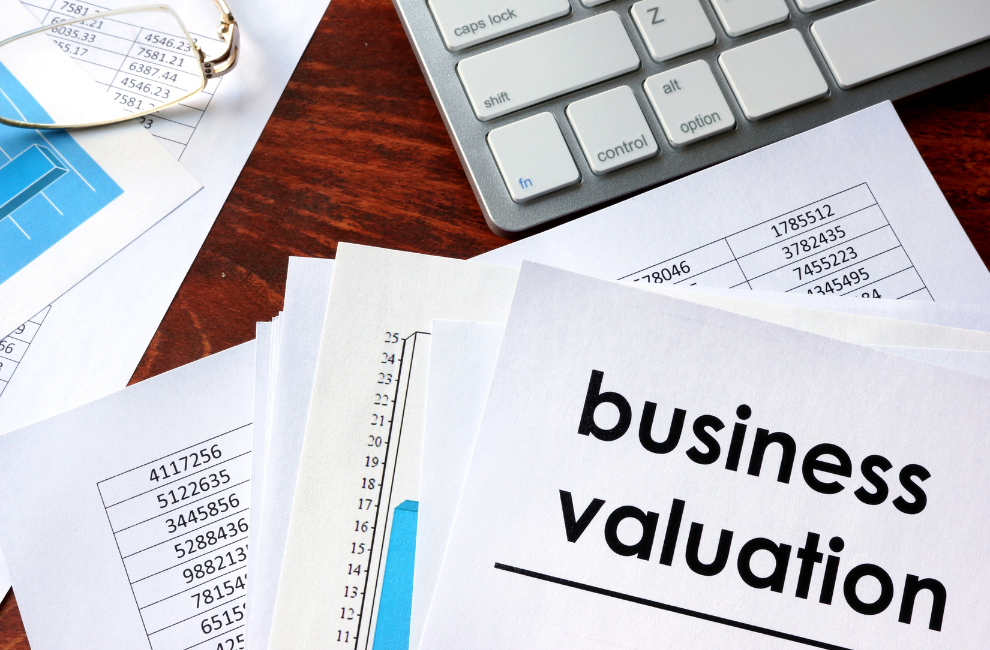How to Value a Service Business for Sale
Understanding Business Valuation Fundamentals
The Importance of Accurate Valuation
An accurate valuation is crucial for understanding the true market worth of your service business. It sets the stage for informed decision-making, whether you're setting a selling price, negotiating with buyers, or seeking financing.
An accurate valuation not only reflects the current financial health of a business but also its potential for sustainability and growth.
To ensure the precision of your business valuation, consider the following steps:
- Regularly update financial records to maintain clear and comprehensive financial statements, which are vital for any valuation method.
- Engage with valuation experts who can provide an objective assessment, taking into account the unique aspects of your business and industry.
While the asset valuation method may yield a conservative estimate, it's important to keep asset records current, factoring in inflation, depreciation, and appreciation. Accurate valuation is a multifaceted process that, when done correctly, can significantly benefit the business owner, especially in the context of a sale or retirement planning.
Overview of Valuation Methods
Valuing a service business requires a nuanced approach, as these entities often rely heavily on intangible assets like customer relationships and brand reputation. Different valuation methods prioritize various aspects of a business, from tangible assets to earning potential. A comprehensive valuation typically involves a blend of these techniques to capture the full picture of a business's worth.
The most common valuation methods include:
- Asset-Based Valuation
- Income-Based Valuation
- Market-Based Valuation
Each method has its own merits and is chosen based on the specific characteristics of the business being valued. For instance, the Asset-Based approach focuses on the company's tangible and intangible assets, while the Income-Based approach looks at the business's cash flow and future earnings potential. The Market-Based approach, on the other hand, compares the business to similar entities in the market, using metrics such as P/E ratios or P/S ratios.
It's essential to understand that no single method can fully encapsulate the value of a service business. A combination of approaches often yields the most accurate and fair valuation.
Assessing Financial Statements and Future Earnings
To accurately value a service business, a thorough assessment of financial statements and future earnings is crucial. Begin with a detailed examination of profit and loss statements, balance sheets, and cash flow reports. Normalize financial data by adjusting for one-time expenses or non-recurring revenues to gain a true picture of the business's financial health.
When projecting future earnings, analyze market trends, customer retention, scalability, and industry innovations. Conduct market research to understand the growth potential and likely profitability of the business compared to its peers.
A comprehensive financial analysis not only reveals the current state of the business but also highlights areas for improvement, influencing the probable market price.
Ensure the financial statements are audited for accuracy. If they haven't been, consider the investment in having them audited. Compare the business's financials against industry norms provided by relevant associations to gauge performance:
- Profit and Loss Statement
- Balance Sheet
- Cash Flow Statement
- Adjusted Financials (Normalized)
- Industry Comparisons
This financial due diligence lays the groundwork for a valuation that reflects the true worth of your service business.
Preparing Your Service Business for Valuation
Enhancing Physical and Digital Presence
Enhancing your service business's physical and digital presence is a critical step in preparing for a successful sale. First impressions are pivotal, and a well-maintained physical location can significantly influence a buyer's perception. Consider the following steps to improve your business's curb appeal:
- Refresh the paint and decor to make your premises more inviting.
- Update fixtures and signage to reflect a modern and professional image.
In parallel, a robust online presence is equally important. Your website and social media platforms are often the first points of contact with potential buyers, so they must convey the right message:
- Ensure your website is user-friendly, visually appealing, and updated with the latest information.
- Showcase customer testimonials and industry accolades to build credibility.
By enhancing both the physical and digital facets of your business, you create a cohesive and attractive package that showcases your business's success and potential, making it more appealing to prospective buyers.
Organizing Legal and Financial Documentation
Organizing your legal and financial documentation is a critical step in valuing your service business. Gather all necessary legal documents, including articles of incorporation, bylaws, operating agreements, and contracts with vendors, suppliers, or partners. Ensure you have all licenses, permits, and registrations to demonstrate the business's legal compliance.
Financial records are equally important. Assemble profit and loss statements, balance sheets, and cash flow statements for the past three to five years. Include tax returns and, if available, audited financial statements to provide a clear picture of your business's financial health.
Engage professionals such as lawyers and accountants to review your documentation. Their expertise can help identify and resolve any legal or financial issues before they become obstacles in the sale process.
Here's a checklist to help you organize your documents:
- Articles of incorporation or organization
- Bylaws and operating agreements
- Contracts with vendors, suppliers, or partners
- Licenses, permits, and registrations
- Profit and loss statements (last 3-5 years)
- Balance sheets (last 3-5 years)
- Cash flow statements (last 3-5 years)
- Tax returns (last 3-5 years)
- Audited financial statements (if available)
Identifying Unique Selling Propositions
When preparing your service business for valuation, pinpointing your unique selling propositions (USPs) is crucial. These are the differentiators that set your business apart from competitors and can significantly influence your business valuation.
- Highlight your strong social media presence or successful ad campaigns.
- Showcase your extensive email list and high-ranking website content.
- Emphasize customer satisfaction through 5-star reviews and testimonials.
By clearly defining and communicating your USPs, you not only enhance the appeal of your business to potential buyers but also potentially affect the business valuation cost.
In Sunnyvale, engaging with professional business brokers can provide you with an accurate business valuation, tailored to reflect your business's unique qualities. Business brokers Sunnyvale are adept at identifying and quantifying the intangible assets that contribute to your business's value, ensuring you receive a fair assessment.
Choosing the Right Valuation Method
Asset-Based Approach
The Asset-Based Approach to business valuation is a straightforward method that calculates a company's net asset value by subtracting its liabilities from its assets. It's a method that shines in scenarios where a business has significant tangible assets, such as equipment, inventory, and property. However, it may not always reflect the full market value for service-oriented businesses where intangible assets like intellectual property and customer goodwill play a crucial role.
Tangible and intangible assets are both critical components in this valuation method. Tangible assets are easily quantifiable, whereas intangible assets, although more challenging to measure, can substantially impact the business's worth.
When applying the Asset-Based Approach, it's essential to meticulously account for all assets and liabilities to ensure an accurate valuation.
Here's a simplified breakdown of the assets typically considered:
- Physical assets (e.g., equipment, real estate)
- Inventory
- Accounts receivable
- Intellectual property
- Brand value
- Customer relationships
- Goodwill
While this method provides a clear picture of the business's asset value, it's important to complement it with other valuation approaches to capture the full spectrum of the business's potential.
Income-Based Approach
The Income-Based Approach to business valuation is centered on the potential profitability of a company. It is particularly relevant for service businesses where future earnings are a key indicator of value. This method is ideal for businesses with stable and predictable cash flows.
Two common techniques within this approach are:
- The Discounted Cash Flow (DCF) method, which involves calculating the present value of expected future cash flows.
- The Capitalization of Earnings method, which uses historical earnings to derive a value by applying a capitalization rate.
The choice between DCF and Capitalization of Earnings often depends on the consistency of a business's income. DCF is preferred for businesses with fluctuating earnings, while the Capitalization of Earnings is suitable for those with more stable income streams.
It's crucial to accurately project future cash flows and select an appropriate discount rate, as these factors significantly influence the valuation outcome. Service businesses should also consider the impact of non-recurring income and expenses to ensure a fair assessment.
Market-Based Approach
The Market-Based Approach to valuing a service business involves analyzing the sale prices of similar businesses within the industry. This comparative method offers a perspective grounded in the current market reality, reflecting what buyers are willing to pay for comparable companies.
When employing this method, it's crucial to consider various financial ratios that are standard in the industry:
- Price-to-Earnings (P/E) Ratio
- Price-to-Sales (P/S) Ratio
- EBITDA Multiples
These ratios are typically derived from the financials of sold or publicly traded companies that closely resemble your own business in size, scope, and market position.
The strength of the Market-Based Approach lies in its reliance on real-world transaction data, providing a tangible benchmark for valuation.
However, it's important to note that this method may not always be applicable, especially if there are not enough comparable businesses or if the market is too volatile. In such cases, combining insights from multiple valuation methods may yield the most accurate assessment.
Maximizing Your Service Business's Value
Improving Operational Efficiency
Efficient operational processes are crucial for a service business, as they not only streamline operations but also significantly enhance the business's appeal to potential buyers. Evaluate and refine your workflows, customer service protocols, and supply chain management to ensure that the business can transition smoothly to new ownership without disruptions.
By presenting a detailed overview of the business's operational framework, including standard operating procedures (SOPs), employee handbooks, and training materials, you offer valuable insights into the internal workings of your business. This transparency in operational excellence can be a key factor in attracting buyers.
Here are some steps to consider when improving operational efficiency:
- Compile and organize operational records, such as employee contracts, vendor agreements, and customer contracts.
- Ensure that all contracts and agreements are current, valid, and transferable to the new owner.
- Document key operational processes, inventory management, marketing strategies, and other essential aspects of the business.
Addressing potential issues upfront not only enhances the value proposition but also builds trust among potential buyers, making your service business a more attractive investment.
Building and Leveraging Brand Value
In the competitive landscape of service businesses, brand value is a critical differentiator. It's not just about having a recognizable name; it's about what that name stands for in the minds of customers. To build and leverage brand value:
- Develop a strong brand identity that resonates with your target audience. This includes a memorable logo, a consistent color scheme, and a clear brand message.
- Cultivate a positive online presence. Ensure your website and social media channels reflect your brand's values and professionalism.
- Gather and showcase customer testimonials. Positive reviews from satisfied customers can significantly enhance credibility.
- Win industry awards. Accolades serve as third-party validation of your business's excellence.
By focusing on these areas, you can create a brand that not only stands out but also adds tangible value to your business, making it more attractive to potential buyers.
Strategies for Growth and Scalability
To maximize the value of your service business, focus on demonstrating its potential for growth and scalability to prospective buyers. This involves outlining clear strategies that show how the business can expand its market reach, diversify its services, or enhance its operational capabilities.
- Market Expansion: Explore new geographical areas or demographics to increase your customer base.
- Service Diversification: Add complementary services or products to attract different customer segments.
- Operational Scaling: Invest in technology or processes that allow for increased service capacity without a proportional increase in costs.
By presenting a well-defined growth plan, you signal to buyers that your business is poised for future success and is capable of adapting to market changes.
Additionally, ensure that your team is prepared for a smooth transition. This includes training and developing leadership within your staff to maintain business continuity. A business that can operate independently of its owner is more attractive to buyers, as it suggests a stable and scalable operation.
Navigating the Sale Process
Setting an Appropriate Asking Price
Determining the right asking price for your service business is a critical step in the sale process. It sets the stage for negotiations and signals to potential buyers the value you place on your business. Your asking price should be grounded in the valuation methods you've employed, reflecting the business's financial health, market position, and growth potential.
- Base your minimum acceptable price on industry comparisons and financial performance.
- Construct a compelling case for your asking price, focusing on the business's strengths and future prospects.
- Be prepared for offers both above and below your initial figure, and remain flexible in negotiations.
When setting your asking price, it's essential to strike a balance between realism and ambition. An overpriced business may deter serious buyers, while underpricing can lead to a loss in potential revenue.
Remember, the asking price is not just a number but a starting point for dialogue with buyers. It's an invitation to explore the business's worth and to negotiate terms that reflect its true value in the marketplace.
Marketing Your Business to Potential Buyers
When it comes to selling your service business, marketing it effectively to potential buyers is crucial. A detailed listing that accentuates your business's unique value proposition, growth potential, and market positioning can make a significant difference. Use persuasive language and clear data to showcase your business's strengths, ensuring that your listing captures attention and engages potential buyers.
Crafting a compelling marketing strategy for your business's sale is as essential as the strategy you used to attract your customers.
Highlight the positive aspects of your business that will appeal to buyers. Whether it's a strong social media presence, impressive ROI from advertising, a substantial email list, or excellent customer reviews, make sure these selling points are front and center. Transparency about your business's past performance and future potential will instill confidence in buyers and can be the key to a successful sale.
Here are some insights to share with potential buyers:
- The reason for selling a profitable business
- Insights into past challenges and how they were managed
- The type of buyer who would be successful with your business
Remember, selling your service business is not just about the numbers; it's about presenting a compelling story that resonates with the right buyer.
Finalizing the Sale: Legal and Financial Considerations
Finalizing the sale of your service business is a critical phase where meticulous attention to legal and financial details is paramount. Ensure all essential documents are compiled and in order, including financial statements, tax records, contracts, and legal documents. This preparation is not just about executing a transaction; it's about smoothly transferring your legacy to the new owners.
Consulting with professionals who specialize in business sales is crucial. Engage a lawyer and an accountant to provide guidance and address any potential issues before they arise. Their expertise will help you navigate the complexities of the sale and avoid any last-minute obstacles.
By adhering to these guidelines, you can facilitate a beneficial agreement for all parties involved and guarantee a seamless transition of ownership.
It's also important to resolve any legal disputes or financial entanglements well before reaching the negotiation table. This proactive approach will showcase your business's readiness for sale and can significantly influence the buyer's confidence in the purchase.
| Preparation Step | Description |
|---|---|
| Document Compilation | Gather financial statements, tax records, contracts, and legal documents. |
| Professional Consultation | Seek advice from lawyers and accountants specializing in business sales. |
| Risk Management | Address legal disputes and financial issues prior to the sale. |
Frequently Asked Questions
-
How do I find out how much my business is worth?
To determine the fair market value of your business, consider financial statements, future earnings potential, intellectual property, brand value, and comparable sales. It's advisable to seek professional assistance for an accurate valuation.
-
What's the best advice for sellers preparing to sell their service business?
Ensure a meticulous approach to highlight your business's value, conduct a thorough business valuation, enhance your physical and digital presence, and have all legal and financial documents organized for a smooth sale process.
-
What are the key actions to take when selling a service-based business?
Key actions include accurately determining your company's worth, boosting its appeal through physical and digital enhancements, and preparing legal and financial documentation for a smooth transaction.
-
How should I approach business valuation for selling my service business?
Approach business valuation by combining different methods such as asset-based, income-based, and market-based approaches. Engage with experts to get a comprehensive view of your business's worth.
-
What is earnings multiplication in business valuation?
Earnings multiplication is a valuation method that applies a multiplier to your business's earnings or profits. The multiplier reflects industry standards, market conditions, and the company's growth potential.
-
How can I set an appropriate asking price for my business?
Set an appropriate asking price by conducting a thorough valuation that considers your business's financial health, market position, and growth potential. Balance the valuation to attract buyers without undervaluing your business.
Recent articles for you
Navigation Links
The World's Authority in Business Sales
© 2024 First Choice Business Brokers Silicon Valley West | Each office is independently owned and operated. Privacy Policy






